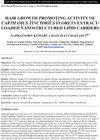 1 citations,
January 2020 in “Research Square (Research Square)”
1 citations,
January 2020 in “Research Square (Research Square)” Banana (Musa × paradisiaca) may help fight cervical cancer and skin cancer.
 1 citations,
January 2020 in “Agriculture, Forestry and Fisheries”
1 citations,
January 2020 in “Agriculture, Forestry and Fisheries” The growth of the Chamaecyparis obtusa trees in Gyeongnam Province, South Korea, was evaluated.
 1 citations,
January 2020 in “Indian Journal of Pharmaceutical Sciences”
1 citations,
January 2020 in “Indian Journal of Pharmaceutical Sciences” Topical treatments can help improve beard growth.
 1 citations,
September 2019 in “Springer eBooks”
1 citations,
September 2019 in “Springer eBooks” Telogen effluvium is a condition that causes temporary hair loss due to stress or shock to the body.
 1 citations,
January 2019 in “Research Journal of Pharmacy and Technology”
1 citations,
January 2019 in “Research Journal of Pharmacy and Technology” Different ways to measure the concentration of Thuja occidentalis in homeopathic solutions were examined.
 1 citations,
December 2018 in “Journal of genetic medicine”
1 citations,
December 2018 in “Journal of genetic medicine” A small change in the TRPS1 gene leads to a less severe form of a syndrome affecting hair, nose, and finger development.
 1 citations,
October 2018 in “Sohag Medical Journal”
1 citations,
October 2018 in “Sohag Medical Journal” Skin changes during pregnancy are common.
 1 citations,
September 2018 in “European Journal of Cancer Prevention”
1 citations,
September 2018 in “European Journal of Cancer Prevention”  1 citations,
June 2018 in “Clinical and Investigative Medicine”
1 citations,
June 2018 in “Clinical and Investigative Medicine” The document's content cannot be processed or summarized.
 1 citations,
January 2018 in “Medical Science and Discovery”
1 citations,
January 2018 in “Medical Science and Discovery” The document's conclusion cannot be provided as the content is not available for parsing.
 1 citations,
December 2017 in “Acta biomedica scientifica”
1 citations,
December 2017 in “Acta biomedica scientifica” Women of reproductive age with polycystic ovary syndrome often experience hair loss.
 1 citations,
May 2017 in “Hair transplant forum international”
1 citations,
May 2017 in “Hair transplant forum international” PRP is beneficial for hair restoration.
 1 citations,
March 2017 in “Hair transplant forum international”
1 citations,
March 2017 in “Hair transplant forum international” The document provides a simple method for beginners to learn hair restoration surgery.
 1 citations,
January 2017 in “Indian Journal of Pharmaceutical Sciences”
1 citations,
January 2017 in “Indian Journal of Pharmaceutical Sciences” Women with PCOS often have different clinical signs, hormone levels, and gynecological issues compared to those without the condition.
 1 citations,
December 2016 in “The Journal of Sexual Medicine”
1 citations,
December 2016 in “The Journal of Sexual Medicine” Many different biological, psychological, and social factors can cause sexual dysfunction in American women.
 1 citations,
April 2016 in “Journal of The American Academy of Dermatology”
1 citations,
April 2016 in “Journal of The American Academy of Dermatology” Blood pressure medications may increase the risk of skin cancer.
 1 citations,
January 2016 in “Springer briefs in molecular science”
1 citations,
January 2016 in “Springer briefs in molecular science” I'm sorry, but there's no information provided for me to summarize.
 1 citations,
January 2016
1 citations,
January 2016 Learn how to do hair restoration surgery.
 1 citations,
November 2015 in “Hair transplant forum international”
1 citations,
November 2015 in “Hair transplant forum international” Dr. Rassman believes hair restoration surgery will significantly improve in the future.
 1 citations,
September 2015 in “Dermatologic Therapy”
1 citations,
September 2015 in “Dermatologic Therapy” Platelet-rich plasma can help treat hair loss condition called alopecia areata.
 1 citations,
January 2015 in “Research Journal of Pharmacy and Technology”
1 citations,
January 2015 in “Research Journal of Pharmacy and Technology” The document's conclusion cannot be provided because the document is not accessible or understandable.
 1 citations,
December 2014 in “International Journal of Pharmacy and Pharmaceutical Sciences”
1 citations,
December 2014 in “International Journal of Pharmacy and Pharmaceutical Sciences” Safflower flower extract in tiny fat-based particles can help hair grow.

Taking care of your hair and managing hair loss requires a combined approach.
 1 citations,
January 2014 in “Journal of Cosmetics, Dermatological Sciences and Applications”
1 citations,
January 2014 in “Journal of Cosmetics, Dermatological Sciences and Applications” The document's conclusion cannot be provided because the content is not available to parse.
 1 citations,
January 2014 in “Clinical Drug Investigation”
1 citations,
January 2014 in “Clinical Drug Investigation”  1 citations,
January 2014 in “Jaypee Brothers Medical Publishers (P) Ltd. eBooks”
1 citations,
January 2014 in “Jaypee Brothers Medical Publishers (P) Ltd. eBooks” The document discusses how to use implanters in hair restoration.
 1 citations,
November 2013 in “Hair transplant forum international”
1 citations,
November 2013 in “Hair transplant forum international” Hair restoration surgery has significantly increased over time.
1 citations,
November 2013 in “Asian Journal of Pharmaceutical and Clinical Research” Medicated oil from Martynia annua leaves and fruits helps prevent hair loss caused by testosterone in mice.
 1 citations,
March 2013 in “Hair transplant forum international”
1 citations,
March 2013 in “Hair transplant forum international” Tissue expansion can help restore hair.
 1 citations,
March 2013 in “PubMed”
1 citations,
March 2013 in “PubMed” The study found that it's hard to tell the difference between two types of hair loss, alopecia areata and telogen effluvium, by looking at symptoms and tissue samples.





























